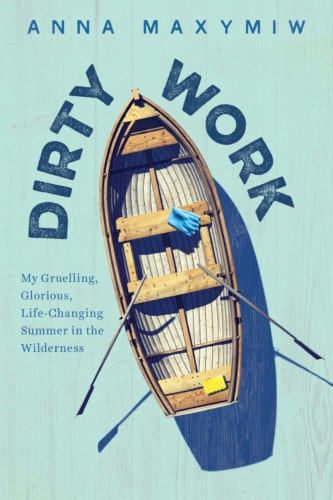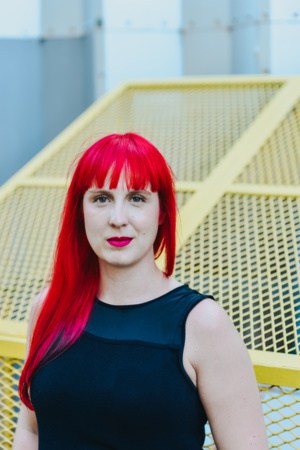Anna Maxymiw’s new memoir, Dirty Work, is a coming-of-age story about spending summers working at a remote fishing lodge in northern Ontario during her early twenties. The book takes you back to a time when everything seemed important, momentous, and changing all the time.
We caught up with Anna this week.
SDTC: Who has had the greatest influence on your writing?
AM: Francesca Lia Block, Alice Hoffman, William Faulkner, Carolyn Smart (who was my undergrad writing mentor), my mum (who patiently edited all my university essays), and my MFA cohort from UBC; they read a lot of my bad early poetry.
What’s on your current reading list?
I Become a Delight to My Enemies by Sara Peters. A Mind Spread Out on the Ground by Alicia Elliott. Foul Balls by Alison Gordon. Good and Mad by Rebecca Traister.
When and where do you feel most content?
Anywhere I’m surrounded by people I love. On a lake fishing, lying on my friend’s carpet petting her cats, dancing in the kitchen at a family get-together.
What dish always satisfies you?
Grilled cheese with strawberry jam.
What show has recently wowed you?
Letterkenny somehow manages to make me laugh out loud while also nimbly taking on issues like white supremacism, abortion, women’s rights, drug use. It’s a revelation.
What Toronto spaces/places do you truly love?
Walking along the Beltline Trail when the trees are lush; the ceiling of Brookfield Place in the afternoon sun; the Lakeview Diner at 3 a.m., when everything feels like a drunken Archie comic. Lunch at Tofu Village; Bar Raval for an afternoon drink; Christie Pits with a Bloomer’s donut for dessert.
Your go-to coping mechanism?
Going to the gym to lift really heavy things. I’ll also watch sad movie scenes on YouTube and have a cry until it feels better.
What five things would you want if you were deserted on an island?
Fishing rod, fillet knife, frying pan, beer batter, potatoes. I’m eating shore lunch every day.
What’s a childhood memory that always brings a smile to your face?
My parents would put on a record (The King and I, Led Zeppelin, Juluka) and clear a space in our living room and we’d have a wild dance. One of my dad’s rules for us as kids was “no dancing on the coffee tables” (it was broken frequently, so that should give you an indication of how often we danced it out).
What life philosophy is currently helping to guide your journey?
“Go at it boldly, and you’ll find unexpected forces closing round you and coming to your aid.”
One skill you’d love to improve this year?
Saying no without explaining myself or apologizing.

What’s a piece of career advice that has served you well?
This is from a former UBC classmate, Ben. He told me that in a writing workshop, one-third of the people will always love your writing, and so you can’t trust their critiques. Another third will always hate your writing, and so you can’t trust them, either. But the final third is the group you need to listen to. I think that maxim also applies to the general population.
What outfit makes you feel the most you?
My wardrobe is almost entirely black, so one of my favourites is a long-sleeved, long-skirted black dress, paired with heeled black boots. The more I can look like a witch, the better I feel. (And people tend to get out of my way.)
What book have you held onto since you were small?
A book of Canadian poetry called Til All the Stars Have Fallen that my parents gave to me when I was a toddler.
What’s a subject that is currently holding your attention?
Strategic lawsuits against public participation, in which someone can effectively stifle or silence a critic or detractor by suing them and therefore weighing them down with legal costs until they give up or are completely drained.
When you compare yourself now to where you were at ten years ago, what’s a major change you can identify?
Everything! There’s a massive difference between twenty-one and thirty-one. But mainly, I have more strength now, especially in my convictions. And I’d hope that I’m getting better at speaking up so others don’t do it for me.
What do you hope readers take away from your memoir?
The term “wilderness” is a tough one for me, since it can sometimes feel paternalistic. Who am I to deem what is wild and what is therefore deemed “civilized”? I usually try to call it the boreal forest, but fishing lodges tend to include “wilderness” in their names.
I’d hope that people consider the beauty of Northern Canada. The breadth of this land. That someone from a city can also admire and even thrive in the not-city. That there are places in this country where you can feel incredibly small, and that it’s important to do that, because humans are not so large in the scheme of things.




 Follow Us On Instagram
Follow Us On Instagram
